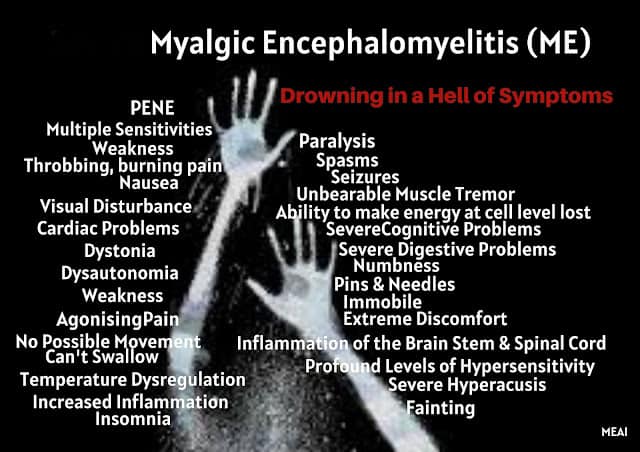While symptoms vary from patient to patient there are a few resources available to aid a proper understanding and to confirm a diagnosis, documents that can be used to highlight individual symptoms and disability. There are many general self-report tools available online but we feel that the ones we suggest below from De Paul University are the best available.
These are some of the useful questionnaires for measuring Myalgic Encephalomyelitis (ME) from the De Paul University. They include:
DePaul Symptom Questionnaire-2 (DSQ-2);
De Paul Pediatric Questionnaires for parent and child;
DePaul Post-Exertional Malaise Questionnaire.
Please see all available questionnaires via link here:
More details about those useful De Paul Questionnaires & links
The DSQ-2 Symptom Questionnaire assesses key symptoms of ME such as post-exertional malaise, sleep, pain, neurological/cognitive impairments and autonomic, neuroendocrine and immune symptoms.
At each item, participants can rate the frequency and severity of the symptom on a scale from 0 to 4. You can put a score for how frequently you have each symptom and how severe it is.
The questionnaire is based on research so useful to print out to complete and show to your GP/Consultant/other.
As much as anything the questionnaire can teach your GP what ME is and you might realise things you think aren’t ME actually are!
Paediatric Questionnaires
DePaul Symptom Questionnaire – Paediatric Screening Questionnaire (DSQ-PSQ): (PDF) DePaul Symptom Questionnaire - Pediatric Screening Questionnaire (DSQ-PSQ) (researchgate.net)
There is a parent and child form available so both adult and child can complete the questionnaires about the child with suspected ME or an ME diagnosis. Completed questionnaires can be used to inform medics re symptoms and severity and could also be used to track symptoms.
DSQ-PED Parent Form: (PDF) DePaul Symptom Questionnaire - Pediatric (Parent Report Form) (DSQ-PED Parent) (researchgate.net)
DSQ-PED Child Form: (PDF) DePaul Symptom Questionnaire - Pediatric (Child Report Form) (DSQ-PED Child) (researchgate.net)
The DPEMQ questionnaire:
Post exertional malaise (PEM) is a key symptom of Myalgic Encephalomyelitis (ME). The PEM questionnaire by De Paul is a questionnaire on the post exertional response in ME, i.e., PEM.
By answering the questions, you get an idea of how ‘activity’, anything you do physically, cognitively, emotionally, affects you and what your individual post exertional response is, i.e., what symptoms occur and increase.
Every person with ME is different. Post exertional response for a lot of people might not occur straight away and tends to be delayed 24 hours or 48 hours after activity.
The questionnaire includes key indicators that show within answering a short set of questions that your illness sounds like it is likely ME.
(PDF) DePaul Symptom Questionnaire - Post-Exertional Malaise short form (DSQ-PEM) (researchgate.net)
Disability and Functional Scales
Bells Disability Scale
We tend to refer to the different severities of ME as Mild, Moderate, Severe, Very Severe, Profound - we refer to those as general categories which really have ranges within themselves ie Mild has its own range, as does Moderate and so on.
A good scale that could be used along with these categories to determine near exact range is the Bells Disability Scale for example, see below. Different people suffer in different ways but the scale gives an idea of the level of disability.
• It can be used by both Patient and Doctor to monitor progress/relapses of ME over time.
• Tick which descriptor best describes you today.
Please see more about the Bells Disability Scale and the full Bells Disability scale here.
Functional Ability
A functional ability scale is an important tool to help you work out where you are with your ME severity, we include the one from Action for ME here.
Thanks to Leonard Jason et al (UK), and to Action For ME (UK)

